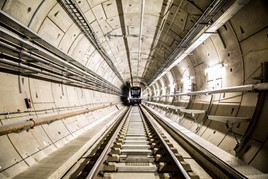You’re developing a business plan that’s due in December. What is in it?
It’s very focused on how we see TfL through the next three years, using the first year related to the financial settlement we have, and then what our priorities will be going forward. Making sure TfL is financially sustainable, making sure we grow our customer and revenue stream, and moving towards net zero. There’s a lot in there: this is the first business plan we have delivered since 2019. It’s a big moment for us.
Can we look at your role in the wider national picture? The strength of your relationship with national Government, you and the other devolved authorities, and how you might fit with Great British Railways, whatever that becomes.
TfL is already working with Network Rail and the Great British Railways Transition Team around how we roll out wider contactless ticketing across the South East. We can show the benefit of TfL across the levelling-up agenda, showing the wider value we bring outside London.
TfL has been a bit on its own over the years. I am really keen that we build relationships. We are much stronger as a collective if we work together.
It’s a widely held opinion in the industry that the Treasury, and the Department for Transport are a bit wary of a devolved organisation as large and as powerful as yours, which spends its money how it chooses, independently of central government. How do you get them to trust you?
It’s a very good question. We are the largest integrated public transport authority in the world. But look at what we have delivered. The transformation on the Tube, for example.
We can also demonstrate the value we bring to the whole UK. Our buses are all built in Northern Ireland, Scotland or north Yorkshire. Our trains for the Overground are built in Derby.
I’ve come from a private sector background. I want us to be a much more commercial organisation, in terms of how we think.
We have 10% inflation. We have what the Bank of England calls the longest recession on record. We have prolonged industrial unrest. In short: we are still on a downward economic curve. Tell me what that means for your people.
It’s really tough, isn’t it? The external economic factors are harder than a lot of people have seen in their lifetimes. What we have to do is demonstrate - with our trade unions - that we can work together rather than fight against each other.
At the same time, while the Government has significant fiscal challenges, we have to make the case for long-term investment, which in return will create greater employment, improve the skills base, and deliver wider improvement - not only in the South East, but in the wider UK.
How is your style going to differ from the previous Andy - Andy Byford?
Andy and I are quite similar in many ways. We have similar principles in how we lead this organisation. I want to make TfL a really great place to work.
Andy was absolutely focused on securing the funding agreement post-COVID. And he was driven by delivering the Elizabeth line.
My focus now is on the wider TfL. We have a number of programmes to deliver. We have the Piccadilly Line, we have the DLR fleet, we have the continuation of the four-line resignalling programme. And the Silvertown road tunnel - the Tunnel Boring Machine is just about to go under the Thames.
And we have to get ridership up. We have to get revenues up. We have to deliver a consistent experience across our network.
For me, it’s about continuing Andy’s visible leadership. And also, an opportunity to rebuild some relationships, particularly with central government. But also, with the wider industry, which Andy wasn’t able to deliver quite as well, because he was in the middle of dealing with the pandemic, at a time when every meeting was done by Teams.
Hopefully now we can get out a bit more and meet in person, including with the new people involved.
You are Interim Commissioner. Everything you’ve just said sounds like you are considering sticking around. Do you intend to be more than the Interim Commissioner?
I’d like to be. Ultimately that is a decision for the Board and the Mayor, but I wouldn’t have taken on this role if I didn’t have the aspiration to do it permanently.
TfL is an amazing organisation: 27,000 direct colleagues, and another 30,000 or more who work indirectly for us in concessions and other service delivery, and the wider supply chain. I am immensely proud to have this opportunity, and I do hope it will continue.
What drives you do to that? This isn’t a Monday to Friday 9-5 job. It’s all-consuming, as Andy Byford admitted. He talked of how it took over his life, of how he took only ten days off in two years. On a purely personal level, is it more of a burden than a challenge?
I don’t think it’s a burden at all. I’ve been involved in operations and engineering all my life. I was operations director at British Airways for seven years - the longest-serving one in the airline’s history. That was full on, 24/7. I’m used to doing that.
But it is really important that we have our down time, that we take our holidays. I’ve been very clear with all my teams about that - you need competent deputies who can stand in when you’re not around. I’m a keen rugby fan, a keen cricket fan, a very average golfer. So, I try to get time to do that.
To be able to say you are leading the biggest and greatest public transport organisation in the world - there’s not at a lot that can top that.














